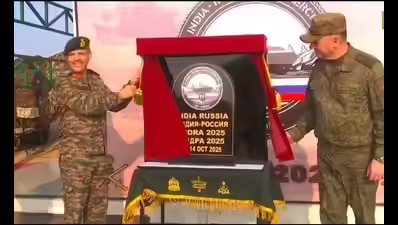Jharkhand Switch to Hindi
Jharkhand Orders Audit of DMFT Fund
Why in News?
The Jharkhand government has decided to conduct a comprehensive audit of the District Mineral Foundation Trust (DMFT) after receiving multiple complaints of fund misuse.
- The audit aims to ensure that welfare schemes in mining-affected areas are implemented effectively and transparently.
About the DMFT and Fund Status
- Formation: The DMFT was established in 2015 under the Pradhan Mantri Khanij Kshetra Kalyan Yojana (PMKKKY).
- Objective: To safeguard the interests of families directly or indirectly affected by mining operations.
- Utilization Areas: Clean drinking water, healthcare, education, women and child welfare, skill development, irrigation, and environmental protection.
- Fund Status: As of August 2025, the cumulative DMFT fund in Jharkhand stands at ₹16,657.95 crore.
- Audit Phase: The first phase will cover Dhanbad, Chaibasa, Chatra, Ramgarh, and Palamu districts.
Pradhan Mantri Khanij Kshetra Kalyan Yojana (PMKKKY)
- Nodal Ministry: Launched in 2015, PMKKKY is a scheme by the Ministry of Mines for the welfare of people & affected areas by using the funds accrued under the District Mineral Foundation (DMF).
- Objectives: Implement welfare projects in mining areas to complement government schemes, mitigate adverse impacts, and ensure sustainable livelihoods.
- PMKKKY 2024 Guidelines: PMKKKY 2024 mandates that at least 70% of DMF funds must be spent on High Priority Sectors, which directly impact the well-being of mining-affected communities.
Uttar Pradesh Switch to Hindi
IUCN's First Gharial Green Status Assessment
Why in News?
The International Union for Conservation of Nature (IUCN) has conducted its first-ever 'Green Status' assessment of the Gharial (Gavialis gangeticus).
- The species has been classified as "Critically Depleted" due to ongoing threats despite years of conservation efforts.
Key Findings
- Current Population and Habitat: The Chambal River (spanning 500 km across Uttar Pradesh, Madhya Pradesh, and Rajasthan) remains the last stronghold of the gharial, housing several thousand individuals.
- The Chambal Sanctuary (established in 1979) is the only site with a viable gharial breeding population in the wild. This sanctuary also protects other endangered species like the Ganges River dolphin and the red-crowned roof turtle.
- Other populations exist only in small, isolated pockets across northern India and Nepal.
- The World Wide Fund for Nature (WWF) India report reveals that only 0.5% of young gharials survive to adulthood, underscoring the critical need for protection of nesting habitats to aid in their recovery.
- Historical Range and Decline: Once abundant across major river systems such as the Ganga, Brahmaputra, Mahanadi, Indus, and Irrawaddy, gharials faced rapid habitat destruction due to Large-scale sand mining, hunting for skins, Egg collection, Construction of dams and barrages.
- By the 1970s, the species had disappeared from nearly 98% of its historic range.
- The current estimate is around 681 adult gharials remaining in the wild, with 80% residing in the Chambal River.
- IUCN 'Green Status' vs. Red List: The IUCN Green Status differs from the traditional Red List by assessing progress toward full ecological recovery rather than just extinction risk.
Rajasthan Switch to Hindi
Rajasthan to Boost Quality of Education
Why in News?
The Rajasthan Education Department has outlined a comprehensive four-part action plan aimed at strengthening foundational literacy among students and enhancing the overall quality of education in government schools.
- The proposed program aims to transform Rajasthan into a model state for implementing National Education Policy (NEP) 2020, enhance government school enrolment, improve children's employability, and lead national academic rankings.
Key Focus Areas of the Plan
- Student Upliftment:
- Digital Monitoring: Attendance of students will be digitally monitored to ensure consistent engagement.
- Textbook Distribution: The timely distribution of textbooks will be ensured, ideally within one month from the start of the academic year.
- Emotional Empowerment: Special video seminars on social, emotional, and ethical learning will be organized, along with counseling camps to help students cope with stress and emotional challenges.
- Board Exam Support: Two question banks or assessment materials will be provided to students preparing for board exams, along with on-call support from subject experts.
- Competitive Exam Preparation: High-performing students in secondary classes will be identified and provided with study materials or reimbursement for purchasing competitive exam materials.
- School Development:
- School Categorization: Schools will be categorized into Gold, Silver, and Bronze based on student test results, academic performance, and sports achievements.
- Gold Schools: High-performing schools will receive priority in resource allocation.
- Teacher Empowerment:
- Teacher Transfer Policy: A new teacher transfer policy will prioritise transfers based on student performance and other criteria, ensuring that skilled teachers are placed in schools where they can have the most impact.
- Specialised Teacher Selection: Teachers with superior academic results will be selected for specialised state-level institutions, ensuring quality education at the institutional level.
- Parental Involvement:
- Mega Parent-Teacher Meetings: Monthly meetings will be organised across the state to engage parents in the educational progress of their children, ensuring that parents play an active role in their child's learning journey.
Rajasthan Switch to Hindi
Exercise Indra 2025
Why in News?
The Indo-Russian joint military exercise 'Indra 2025' is being held from 6th to 15th October 2025, at the Mahajan Field Firing Range in Bikaner, Rajasthan.
Key Points
- Objectives: This year’s exercise emphasises counter-terrorism, aligning with the strategic doctrines of both India and Russia, reflecting their shared priorities in addressing modern security challenges.
- Focus Areas:
- Joint tactical exercises
- Live-fire training
- Close-quarter combat under desert conditions
- Simulated hostage-rescue missions, elimination of insurgent networks, and precision engagement of fortified positions.
- Features:
- The exercise involves high-intensity drills, including rehearsals of unmanned aerial vehicle (UAV) integration for reconnaissance and target acquisition.
- Air support coordination and the synchronisation of artillery and armoured elements in limited-visibility environments are also key components of the drills.
- Troops will operate under strict rules of engagement to ensure realistic and disciplined execution of operations.
- Historical Context:
- The Indra series of exercises began in 2003 and alternates between India and Russia.
- The last exercise was held in 2021, but the series was paused after the outbreak of the Russia-Ukraine war in 2022.
- Significance: With evolving military technologies and joint operations, this exercise helps both nations refine their tactics and improve interoperability, especially in hostile environments.
Bihar Switch to Hindi
Unreported Cash Property Deals Flagged in Bihar and UP
Why in News?
The income tax department has focused on cash transactions exceeding Rs 2 lakh in property deals, uncovering violations in Bihar and Uttar Pradesh, particularly in districts bordering Nepal, where sub-registrars have failed to share data.
Key Points
- About: A nationwide exercise, initiated following the Supreme Court's April 2025 directions, uncovered multiple instances of entire property transactions being conducted in cash, highlighting concerns over transparency and compliance.
- The department has intensified its efforts to track black money and crack down on cash transactions in high-value deals by collecting and analyzing vast amounts of data.
- Misreporting of Data: Sub-registrars in Bihar and UP have been found misreporting property transaction data, prompting the tax department to raise concerns and instruct officials to ensure proper data sharing and compliance with registration processes.
- Scale of Problem in Bihar: Spot verifications in districts like Kishanganj, Sitamarhi, Araria, and Madhubani in Bihar revealed:
- Around 250-300 instances of cash transactions over Rs 2 lakh not being reported.
- Failure to report transactions exceeding Rs 30 lakh as mandated by law.
- In a single sub-registrar office, over 600 property transactions worth Rs 250 crore were not reported over three years.
- PAN details for transactions were not captured or shared.
- Scale of Problem in UP: While the problem is less severe in UP, issues were found in districts like Maharajganj and Pilibhit.
- There were defective entries in several property deals, and cash transactions exceeding Rs 2 lakh were still prevalent, though on a smaller scale compared to Bihar.
Jharkhand Switch to Hindi
First Death Anniversary of Ratan Tata
Why in News?
On the first death anniversary of Ratan Tata, former Chairman of Tata Sons, the Tata Motors Workers Union in Jamshedpur paid floral tributes to the legendary industrialist.
Key Facts About Ratan Tata
- About:
- He was a respected Indian businessman and former chairman of Tata Group, one of India’s largest conglomerates.
- He was awarded the Padma Bhushan in 2000 and the Padma Vibhushan in 2008.
- He graduated in architecture from Cornell University before returning to India in 1962 to join the Tata Group, founded by his great-grandfather, Jamsetji Tata.
- He was a licensed pilot, known for his quiet demeanour, relatively modest lifestyle and philanthropic initiatives.
- Achievements:
- Ratan Tata played a key role in transforming Tata Group into a global powerhouse, with ventures spanning industries such as steel, automobiles, software, and telecommunications.
- Early in his career, he worked with several Tata companies, including Tata Motors (formerly Telco) and Tata Steel, and revitalised the National Radio & Electronics Company.
- In 1991, he succeeded J.R.D. Tata as chairman of Tata Group.
- He implemented significant organizational reforms such as enforcing retirement ages and promoting young talent to leadership roles.
- He was also awarded with:
- Assam Baibhav by Government of Assam in 2021.
- Honorary Officer of the Order of Australia by King Charles III in 2023.
- Honorary Doctor of Science by IIT Bombay in 2008
- Honorary Knight Grand Cross of the Order of the British Empire (GBE) by Queen Elizabeth II in 2014
- Honorary Citizen Award by Government of Singapore in 2008.
- Contributions:
- Tata set up Tata Teleservices in 1996 and took Tata Consultancy Services (TCS) public in 2004, capitalising on the IT boom.
- His leadership marked significant international acquisitions, including:
- The purchase of Tetley Tea in 2000.
- Acquisition of VSNL (Videsh Sanchar Nigam Limited) in 2002.
- The acquisition of Corus Steel in 2007, one of the largest takeovers by an Indian company.
- The acquisition of Jaguar and Land Rover from Ford in 2008.
- Tata played a key role in Tata Group's acquisition of Air India from the government in January 2022.
Jharkhand Switch to Hindi
Tobacco Free Youth Campaign 3.0
Why in News?
The ‘Tobacco Free Youth Campaign 3.0’ was inaugurated in East Singhbhum district under the National Tobacco Control Programme (NTCP).
- The campaign, launched by Civil Surgeon Dr. Sahir Paul, aims to spread awareness about the ill effects of tobacco consumption and promote a healthy, addiction-free lifestyle among the youth.
Key Points
- A 60-Day Awareness Drive: The campaign began on 9th October 2025, and will continue for 60 days across the district.
-
Dr. Sahir Paul administered an oath against tobacco use and led a signature drive promoting a healthier society.
-
The campaign’s primary goal is to educate young people about the harmful effects of tobacco and to inspire them to adopt a nasha mukt (drug-free) way of life.
-
Community & Institutional Participation: The campaign will see active collaboration among government departments, NGOs, and volunteer groups to ensure widespread participation.
- It also aims to declare educational institutions and villages as tobacco-free zones, fostering health awareness in both urban and rural areas.
National Tobacco Control Programme (NTCP)
- The NTCP was launched in 2007–08 during the 11th Five-Year Plan to reduce tobacco use and related health risks.
- It aims to create awareness about the harmful effects of tobacco, reduce its production and supply, ensure enforcement of the Cigarettes and Other Tobacco Products Act (COTPA), and help people quit tobacco.
- The NTCP also aligns with the WHO Framework Convention on Tobacco Control.
- Implemented through a three-tier structure—national, state, and district levels—it currently covers all 36 States and Union Territories, spanning about 612 districts.
- The programme has contributed to a reduction of about 8.1 million tobacco users in India.





 PCS Parikshan
PCS Parikshan



